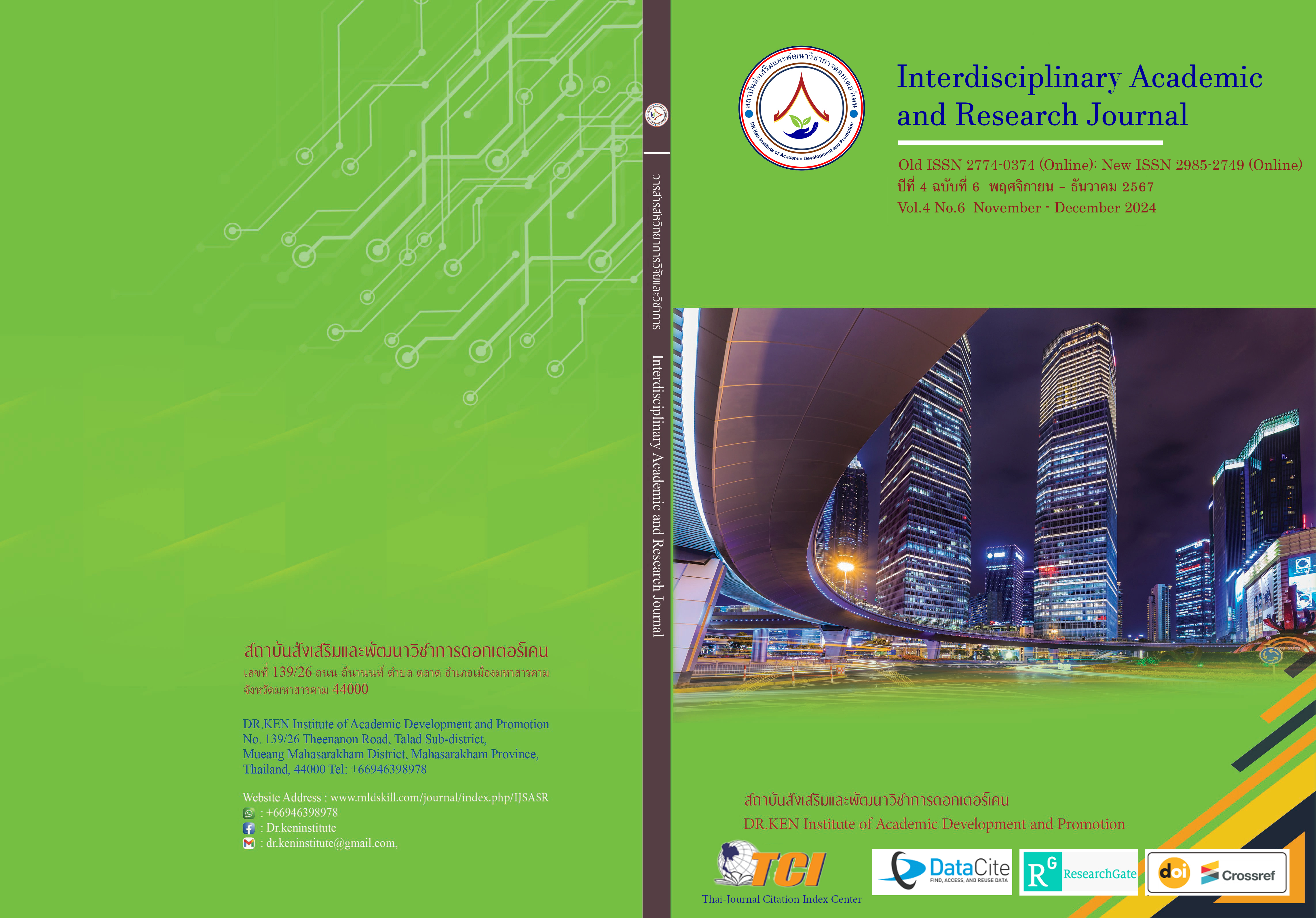The Development Guidelines for Coaching and Mentoring Skills of School Administrators under the Mahasarakham Primary Educational Service Area 2
DOI:
https://doi.org/10.60027/iarj.2024.280000Keywords:
Development Guidelines, Coaching and Mentoring Skills, School AdministratorsAbstract
Background and Aims: Administrators at all levels are responsible for coaching their subordinates to achieve success in their work. When administrators shift from traditional teaching methods to coaching or mentoring, they can unlock the potential of their subordinates in terms of knowledge, various skills, and desired characteristics as specified. Therefore, this research aims to study the current desirable state and the priority need for coaching and mentoring skills of school administrators under the Maha Sarakham primary educational service area 2 and to study the development guidelines for coaching and mentoring skills of school administrators under the Maha Sarakham primary educational service area 2.
Methodology: The research process was divided into 2 phases: Phase 1; to study the current, desirable state and priority need index of coaching and mentoring skills of school administrators. The sample group of 306 were 140 school administrators and 166 teachers by stratified random sampling). The research tool was a questionnaire, with a reliability of 0.94 and a discrimination power of 0.31 – 0.82. The statistics used for data analysis were mean and standard deviation. Phase 2; to study the development guidelines for coaching and mentoring skills of school administrators. The Key Informant groups include 6 experts for studying the development guidelines and 7 experts for evaluating guidelines. The research instruments were interview form and evaluate form the suitability and feasibility.
Results: 1. The current state overall was high average and the desirable state overall was in the highest level. The priority needs ranked from high to low level were 1) Listening skills 2) Questioning skills 3) Reflective skills 4) Human skills 5) Trust skills. 2. The development guidelines for coaching and mentoring skills of school administrators under the Maha Sarakham primary educational service area 2 was 18 guidelines as follows: 1) Listening skills were 4 guidelines 2) Questioning skills were 3 guidelines 3) Reflective skills were 3 guidelines 4) Human skills was 4 guidelines 5) Trust skills was 4 guidelines. The results of evaluating the suitability and feasibility of the overall approach were at the highest level.
Conclusion: The coaching and mentoring skills of school administrators, specifically within the Mahasarakham Primary Educational Service Area Office 2, involve the ability to guide, teach, and provide advice to assist, advise, and support teachers and staff. This is achieved through various processes and activities aimed at improving performance so that teachers and staff understand how to perform their roles and behaviors effectively. The goal is to enhance the knowledge, skills, and behaviors of teachers and staff to achieve set objectives and advance professionally. The skills required include Listening skills, Questioning skills, Reflective skills, Human skills, and Trust skills.
References
เฉลิมชัย พันธ์เลิศ. (2562). หลักสูตรฐานสมรรถนะกับการพัฒนาผู้เรียน. วารสารวิชาการ. 22 (1), 22-30.
ชาญชัย อาจินสมาจาร. (2551). ทักษะภาวะผู้นำ. กรุงเทพฯ : มัลติอินฟอร์เมชันเทคโนโลยี.
ธนา ธุศรีวรรณ. (2562). การพัฒนารูปแบบการชี้แนะเพื่อส่งเสริมทักษะการจัดการเรียนรู้ในศตวรรษที่ 21 สำหรับครูระดับมัธยมศึกษา. วารสารวิชาการมหาวิทยาลัยการจัดการและเทคโนโลยีอีสเทิร์น, 16(2), 535-547.
เพิ่มพูน พงษ์พวงเพชร. (2560). การพัฒนาระบบการสอนงานและการเป็นพี่เลี้ยงสำหรับบุคลากรในสำนักงานเขตพื้นที่การศึกษา. วิทยานิพนธ์การศึกษาดุษฎีบัณฑิต สาขาวิชาการบริหารและพัฒนาการศึกษา มหาวิทยาลัยมหาสารคาม.
ไพศาล สุวรรณน้อย. (2559). การเรียนรู้โดยใช้ปัญหาเป็นฐาน (Problem-Base Learning : PBL). Retrieved on March 25, 2022 from: https://ph.kku.ac.th/thai/images/file/km/pbl-he-58-1.pdf
วัชรา เล่าเรียนดี. (2556). ศาสตร์นิเทศการสอนและการโค้ชการพัฒนาวิชาชีพ : ทฤษฎีกลยุทธ์สู่การปฏิบัติ. พิมพ์ครั้งที่ 12, มหาวิทยาลัยศิลปากร.
วันซาวีลา เบ็ญลาเตะ. (2562). การพัฒนารูปแบบการสอนงานในสถานศึกษาขั้นพื้นฐานภายใต้บริบทสามจังหวัดชายแดนภาคใต้. วิทยานิพนธ์ศึกษาศาตรดุษฎีบัณฑิต สาขาวิชาการบริหารการศึกษา มหาวิทยาลัยสงขลานครินทร์.
วิชัย วงษ์ใหญ่และมารุต พัฒนผล. (2557). การโค้ช เพื่อการรู้คิด (Cognitive Coaching). กรุงเทพฯ : จรัลสนิทวงศ์.
ศศิมา สุขสว่าง. (2562). การพัฒนานวัตกรรมโดยใช้ Design Thinking. Retrieved January 15, 2024, from: https://hcd-innovation.teachable.com/courses/author/290247.
ศิริรัตน์ ศิริวรรณ. (2557). การโค้ชเพื่อการพัฒนาผลงานที่ยอดเยี่ยม. กรุงเทพฯ: เอช อาร์ เซ็นเตอร์.
สมหมาย ปวะบุตร. (2563). การสร้างกระบวนการโค้ชด้วยหลักพุทธธรรมของครูพี่เลี้ยงในโรงเรียนร่วมพัฒนาวิชาชีพครู. วิทยานิพนธ์พุทธศาสตรดุษฎีบัณฑิต สาขาวิชาพุทธบริหารการศึกษา มหาวิทยาลัยมหาจุฬาลงกรณราชวิทยาลัย.
สำนักงานเขตพื้นที่การศึกษาประถมศึกษามหาสารคาม เขต 2. (2566). รายงานผลการดำเนินงานประจำปีงบประมาณ พ.ศ. 2566. มหาสารคาม : กลุ่มนโยบายและแผน สำนักงานเขตพื้นที่การศึกษาประถมศึกษามหาสารคาม เขต 2.
สำนักพัฒนาและถ่ายทอดเทคโนโลยีการสหกรณ์. (2562). การสอนงานบุคลากรด้วยระบบพี่เลี้ยง (Mentoring). สงขลา : ศูนย์ถ่ายทอดเทคโนโลยีการสหกรณ์ที่ 18 จังหวัดสงขลา สำนักพัฒนาและถ่ายทอดเทคโนโลยีการสหกรณ์ กรมส่งเสริมสหกรณ์.
สิราวิชญ์ วัชรกาฬ, ณรงค์ พิมสาร และ สิริกาญจน์ ธนวุฒพรพินิจ. (2562). รูปแบบการพัฒนาทักษะการโค้ชสาหรับผู้บริหารสถานศึกษา สังกัดกรุงเทพมหานคร. วารสารวิจัยทางการศึกษา คณะศึกษาศาสตร์ มหาวิทยาลัยศรีนครินทรวิโรฒ, 14(2), 163-177.
สุวิมล ว่องวานิช. (2558). การวิจัยประเมินความต้องการจำเป็น. พิมพ์ครั้งที่ 3, จุฬาลงกรณ์มหาวิทยาลัย
อาภรณ์ ภู่วิทยพันธุ์. (2560). การพัฒนาสมรรถนะกลุ่มงาน HR บนแนวคิด 70:20:10 Learning model. กรุงเทพฯ : เดช อาร์ เซ็นเตอร์.
อุทิศ ดวงผาสุข, เฉลิมชัย กิตติศักดิ์นาวิน และนลินณัฐ ดีสวัสดิ์. (2560). การบริหารโดยการโค้ชเพื่อการพัฒนาองค์การ. วารสารวิชาการมหาวิทยาลัยธนบุรี. 11 (26), 135-136.
Boyce, L. A., Jeffrey Jackson, R., & Neal, L. J. (2010). Building successful leadership coaching relationships: examining the impact of matching criteria in a leadership coaching program. Journal of Management Development, 29(10), 914-931.
Cronbach, L.J. (1970). Essentials of Psychological Testing. 3rd edition. New York: Harper and Row.
European Mentoring & Coaching Council (2012). The International Journal of Mentoring and Coaching. https://www.emccglobal.org/wp-content/uploads/2018/02/33-1.pdf
Downloads
Published
How to Cite
Issue
Section
License
Copyright (c) 2024 Interdisciplinary Academic and Research Journal

This work is licensed under a Creative Commons Attribution-NonCommercial-NoDerivatives 4.0 International License.
Copyright on any article in the Interdisciplinary Academic and Research Journal is retained by the author(s) under the under the Creative Commons Attribution-NonCommercial-NoDerivatives 4.0 International License. Permission to use text, content, images, etc. of publication. Any user to read, download, copy, distribute, print, search, or link to the full texts of articles, crawl them for indexing, pass them as data to software, or use them for any other lawful purpose. But do not use it for commercial use or with the intent to benefit any business.
















.png)


